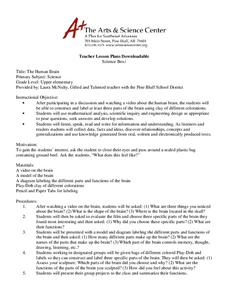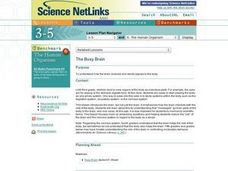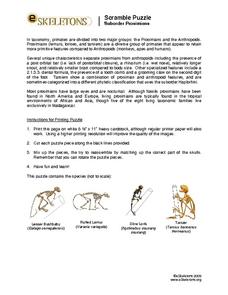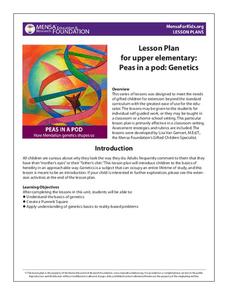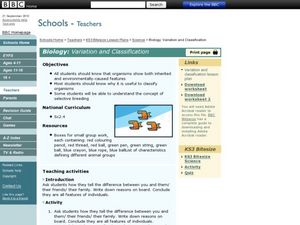Curated OER
Eyes On Me
Students investigate the human eye. In this biology lesson, students read the book Look At Your Eyes and locate the various parts of their eye. Students play the game "I Spy."
Curated OER
Entering the Eye
The human eye is the focus of this biology PowerPoint. The presentation takes a virtual trip inside of the human eye and allows learners to view the various parts of the eye. The best part (for me) are all of the optical illusions that...
Tinybop
The Human Body
Examine the systems of the human body with a bold, charming, and kid-friendly application. This noteworthy tool is certain to get kids interested what goes on inside of them! The eye feature uses the tablet camera to view images and show...
Curated OER
The Human Brain
Students identify parts of the human brain. In this biology lesson, students watch a video about the human brain. Students use different colors of clay to construct and label the three parts of the brain.
Curated OER
Introduction to Biology
Students participate in a variety of activities to introduce them to biology. In this biology lesson plan, students use microscopes, discover bacteria, view human anatomy, and more.
Curated OER
Growing Eyeballs
Students investigate vision and the anatomy of the human eye. They complete a Webquest, watch a video about the structure of the eye, take an online quiz, answer discussion questions, and read newspaper articles about activities that...
Curated OER
The Busy Brain
Learners explore biology by completing a human body worksheet. In this human brain lesson, students identify the different anatomy within the brain and the functions those pieces form. Learners read an article about signals in the brain...
eSkeletons
Skeleton Scramble Puzzle: Suborder Prosimians
Explore the finer details of primate skulls with these puzzles, incorporating advanced scientific analysis of two suborders- Prosimians and Anthropoidea- and one superfamily- Hominoidea. Learners read about the unique characteristics of...
Curated OER
Human Body
In this biology worksheet, students complete a paragraph about the human body and the eyes. They fill-in the blanks with the correct word from the word bank. There are 21 blanks to complete.
MENSA Education & Research Foundation
Peas in a Pod: Genetics
Can peas have grandparents? Learn about inherited traits and heredity with a set of activities focused on Mendelian genetics. As your class learns about the process of passing traits along in Punnett squares, they take on the role of...
Curated OER
Biology: Variation and Classification
Young scholars investigate classification of different animal groups. In this biology lesson students list characteristics of themselves and others they know to show differences and how they are classified. Young scholars then answer...
Curated OER
Outer Body Parts
In this biology worksheet, students locate 32 words that name body parts in a word search puzzle. They find the words that are listed in a word bank at the bottom of the page.
Curated OER
Making Sense of Things: The Human Body and Senses
Students conduct an experiment to evaluate the accuracy of their senses.
Curated OER
Comparison of Normal vs Mutant Zebra Fish Embryos
Students observe and study mutations. In this mutations lesson, students work in groups to complete observation tables of various mutations of the zebra fish embryos. Groups give presentations about their observations.
Curated OER
Honeybee
Students investigate honeybees and the importance of honeybees to humans. They identify the various parts of a bee's body using velcro parts, role-play a hive, and answer review questions.





